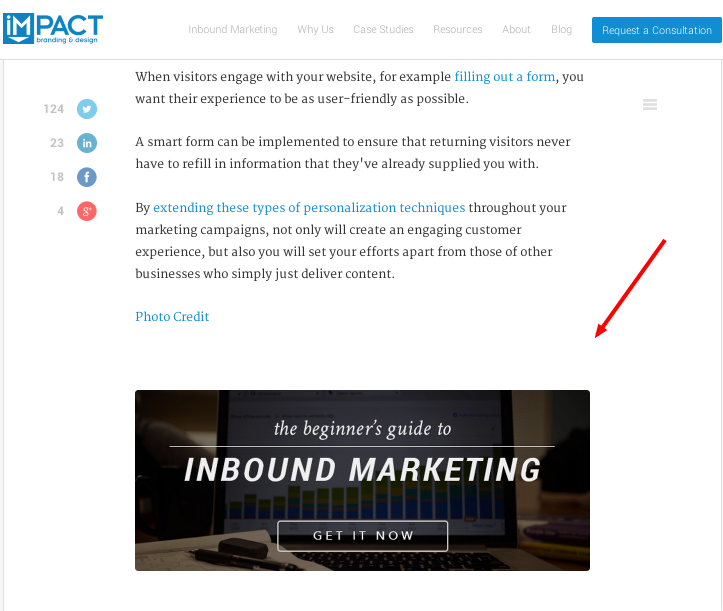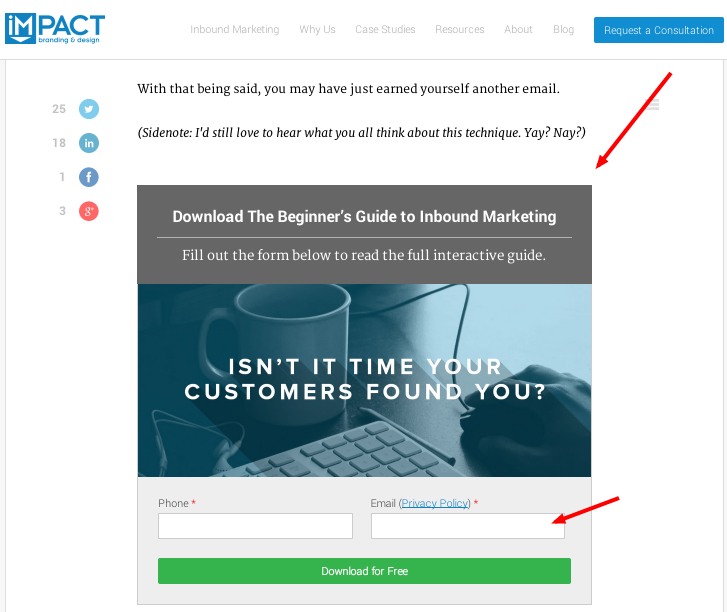Topics:
Lead GenerationSubscribe now and get the latest podcast releases delivered straight to your inbox.
 Usually I stay away from writing titles with crooked numbers in them like this.
Usually I stay away from writing titles with crooked numbers in them like this.
But six months ago we made a pretty big change to our blog, and I’ve been sitting on this data, just waiting to share it with you.
Because it’s huge. At least, it has been for us.
And that should serve as a disclaimer; there is no substitute for testing things for yourself, whether it’s advice you read here or elsewhere. The internet is full of crappy and misleading data, and while we’re certainly not going to add to it, you should always try things out for yourself.
Phew. Okay, now that we've got that out of the way, let me hit you with some background.
As I said, about six months ago we were looking for ways to increase conversions on our blog. We were already generating tons of traffic and leads, but the thing is, we had been doing so for months. And while that's great, when you're overseeing a marketing department of a fast-growing agency, the expectation is to always improve in order to support the growth.
If we were to avoid plateauing, we needed to break things and put them back together.
It’s really easy to sit back and watch things work well. But what if they could work even better? And most importantly, what if I could share my findings with clients and fellow marketers?
How we increased conversions on our blog posts
First, we removed the entire sidebar from our blog. Sacrilege in marketing, sure, but sometimes you get ahead by doing what everyone else is afraid to do.
But that was just the start. When it came to a handful of our best ebook offers, I wanted to try replacing the standard below the post call-to-action button with a full lead form. Right at the end of the blog post, essentially cutting out the middleman. (Sorry landing page. We cool.)
So instead of this…

The bottom of our blog posts looked like this.

What happens next is surprising (kinda)
What we found by replacing the standard call-to-action button was that we lost less people in the transition from the blog post to the landing page.
Taking our flagship offer, The Beginner’s Guide to Inbound Marketing, as an example, the click-through rate was a respectable 3.21% and the click-to-submission a robust 43.75%.
The kicker? This still couldn’t make up for a simple 2% submission rate on the full lead form of the same offer over the same five month period.
On the surface the percentages may not make sense, but remember, because we’ve eliminated the need to click-through to a landing page, each of our blog posts with this offer have essentially become landing pages themselves.
And which do you think gets more traffic…your blog? Or landing pages?
We discovered a hack for driving more people to landing pages that aren’t really landing pages. They're blog posts with helpful information. They're far more generous.
Nothing converts like generosity.
Heck, you’re on a landing page right now. And if you’ve gotten this far, chances are I’ve been pretty helpful. What better value proposition could there be for filling out an offer below?
Well, here’s how our audience responded.

That's good for an increase of over 78%.
By lowering the barrier of entry to our premium content, we've been able to convert people who may not have otherwise. Blog posts are also a lot easier to promote in comparison to traditional landing pages, as the content isn't gated. People are being helped whether they convert or not.
This isn't to say landing pages aren't important. They are. This is simply a supplemental tactic to employ in very specific situations.
As I said earlier, there is no substitution for testing this out for yourself. No two ecosystems are alike, as people will behave differently on your blog than they do ours. HubSpot published a post recently testing these variables with a different outcome.
So don’t take my word for it. Break things for yourself.


Order Your Copy of Marcus Sheridan's New Book — Endless Customers!

